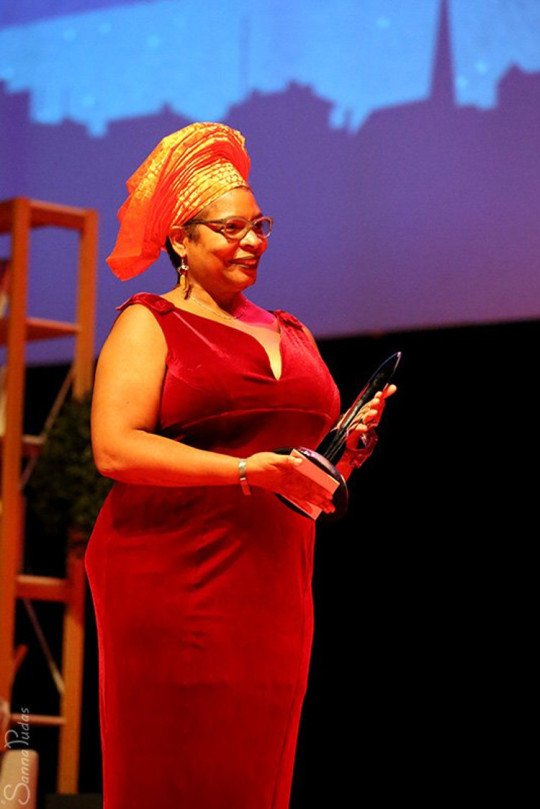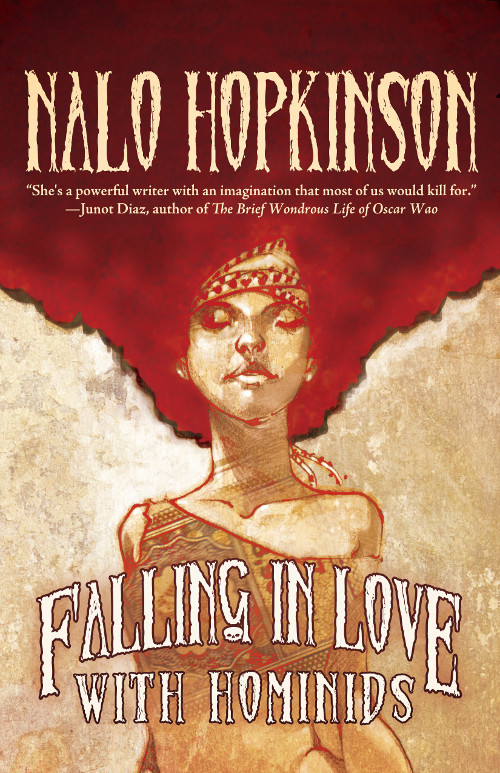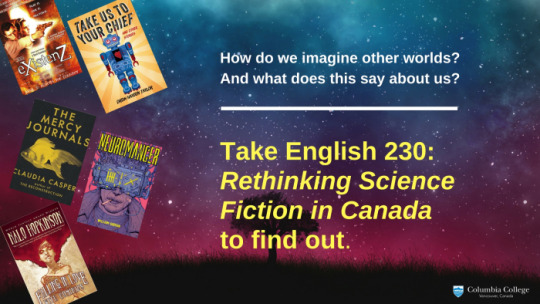Nalo Hopkinson and FALLING IN LOVE WITH HOMINIDS continue to impress

Photo: Sanna Pudas
Izzy Bynum‘s winning letter for the Library of Congress’ Letters About Literature is to Nalo Hopkinson.
Dear Ms. Hopkinson,
If you saw me, the first thing you’d notice is that I’m fat. At least, that’s what I assume you’d notice because that’s always been the sort of thing that I get caught up on. Being a fat kid has always been the biggest thing about me, to the point where I wouldn’t know how to describe myself without it. I’ve been on the receiving end of countless looks—the ones that say, “Yikes, I hope I don’t look like that,” and “I hope she doesn’t sit down next to me,” and “At least I’m better than her”—subtle (or not so subtle) jabs about my weight, and comments about the state of my health. Certainly not from most people, but it happens enough to where I end up finding insults in everyone’s words. My entire personality is based on the fact that I always feel like I’m taking up too much space, drawing too much attention to myself, or being a burden. I have a tendency to look down at all my efforts, thinking that nothing I do can ever be decent because it was made by my own two hands, which are short and stubby and fat.
I’ve always loved writing. When I was younger and less self-conscious, I would write stories for everyone in my family. I entered state writing contests. But as time went on and I got older and thicker, I started dropping out of all of those things because I thought I wasn’t good enough. When I was elementary school, I won some contest with the Young Pegasus Poet’s Society and had to go downtown to receive my award. I look back on it now and regret even entering the contest because the dress I wore to the presentation ceremony showed how fat my arms were. Until reading The Smile on the Face, I never realized how sad that is. I’d won a poetry contest! I should be proud; I shouldn’t keep that memory pushed far away like something painful or cringe every time my mom brings out pictures to show people.
Your Gilla, like me, is amazingly, delightfully, undoubtedly a fat kid. I didn’t realize how few books had a character who was fat until she resonated with me so completely. It was like putting on a jacket that fit for the first time; I hadn’t realized how tight the others had been until this one was just right. I saw so much of myself in Gilla. All the tiny discomforts, the passing fears, and intruding thoughts that I thought had been particular to me were spelled out right there on the page in the way she refuses to eat at the party because then people would see her eating, or how she couldn’t help but notice the one fat girl in the teen movie playing and wonder why she was there, or as she recoils from all the subtle jabs Roger and his cronies send her way.

But just as much as you show her struggling, you show her overcoming. When everything looks dark and Gilla is locked in the closet with Roger as he degrades her, you give her the power to fight back. Gilla’s transformation into a powerful, fire-spitting dragon is only possible because she tells herself that she’s powerful, that she should fight back against Roger and anyone else who tries to put her down for who she is. That image of her finally believing in herself so much that it terrifies those who would go against her has stuck with me ever since. It’s had me swallowing cherry pits in the hope that somehow I’d stumble upon some magic that tells me why everything I hate about myself isn’t bad. But I know that I’ve already got something to tell me that: your story.
Every time I looked at myself in the mirror, I saw my fat as a flaw, as something to pretend didn’t exist, something to be ashamed of. But you said that Gilla—that I—was strong and hearty and valuable. You said that I deserved respect. You said I should fight. That was the first time anyone had ever told me that.
After reading The Smile on the Face, I’m not suddenly a confident person. Obviously and unfortunately, that’s not how things work. But seeing Gilla’s literal transformation into someone more self-confident and content with herself showed me for the first time that it’s okay to be happy with who I am right now. It’s okay to be satisfied with being fat; my main goal of life doesn’t have to be getting thinner. Because of your story, I now realize that I deserve respect no matter what my size, and I’ve started the process by demanding it from myself. Thank you.
Levar Burton shared this via Twitter.
Two big announcements for our LA live taping of #LeVarBurtonReads: we’re moving it to May 2nd @RegentTheaterLA, and the immensely talented sci-fi writer @Nalo_Hopkinson be my featured author and guest! (Ace tix from April 26 will be honored): http://ow.ly/yTOg30jjF3G

Columbia College is using FALLING IN LOVE WITH HOMINIDS as text for English 230: Rethinking Science Fiction in Canada.
How do we imagine worlds other than our own? What happens when two very different worlds collide? When we tell stories about robots and aliens and environmental disasters and virtual reality video games, are we actually telling stories about ourselves, about our own place and time? English 230, “Rethinking Science Fiction in Canada”, presents an opportunity to explore these questions in an approachable way: through directed study, meeting once a week to discuss ideas and stories, and gaining credits towards your degree in the process!
Instructor: Graham Lyons
Course: English 230, Sec 99
Register today!
Email glyons@columbiacollege.ca for more information.
For more information on FALLING IN LOVE WITH HOMINIDS, visit the Tachyon page.
Cover art by Chuma Hill
Design by Elizabeth Story
